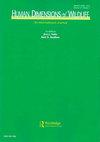关于鳄鱼和乌龟。刻板印象、情绪倾向和对保护的影响
IF 1.7
4区 环境科学与生态学
Q2 BIODIVERSITY CONSERVATION
引用次数: 2
摘要
摘要尽管全球威胁日益严重,但由于一系列影响态度和情绪的因素,爬行动物并不是动物保护的首选群体。这项研究将目前对鳄鱼和海龟的了解扩展到人们的刻板印象和情绪倾向。通过刻板印象内容模型,鳄鱼被发现属于威胁性的敬畏刻板印象,产生了尊重和恐惧的感觉,但也吸引了我们的注意力和钦佩。这种刻板印象也与被动的便利和主动的伤害有关。尽管参与者对鳄鱼保护表现出温和的积极态度,并表示有意帮助鳄鱼保护信托基金,但鳄鱼在捐赠偏好中排名最后。另一方面,海龟被发现符合保护性的刻板印象,表现为深情和能干,并被视为属于同类。这些情绪反映了参与者在保护态度和意图方面的主动和被动促进倾向。本文章由计算机程序翻译,如有差异,请以英文原文为准。
On crocodiles and turtles. Stereotypes, emotional tendencies and implications for conservation
ABSTRACT Even with the increasing global threat, reptiles have not been a preferential group for animal conservation due to a set of factors affecting attitudes and emotions. This research extends the current knowledge of crocodiles and turtles to stereotypes and emotional dispositions people have. Through the Stereotype Content Model, crocodiles were found to belong to the threatening-awe stereotype, generating feelings of respect and fear but also holding our attention and admiration. This stereotype is also associated with passive facilitation and active harm. Even though participants showed mild positive attitudes toward crocodile conservation and expressed intent to help a crocodile conservation trust, crocodiles ranked last in the donation preference. Turtles, on the other hand, were found to fit the protective stereotype, represented as affectionate and competent and were viewed as belonging to the in-group. These emotions reflected the participants’ predisposition for active and passive facilitation with regard to conservation attitudes and intentions.
求助全文
通过发布文献求助,成功后即可免费获取论文全文。
去求助
来源期刊

Human Dimensions of Wildlife
Environmental Science-Nature and Landscape Conservation
CiteScore
4.40
自引率
12.50%
发文量
33
期刊介绍:
Human Dimensions of Wildlife is devoted to the study of social considerations in fisheries and wildlife management.
 求助内容:
求助内容: 应助结果提醒方式:
应助结果提醒方式:


